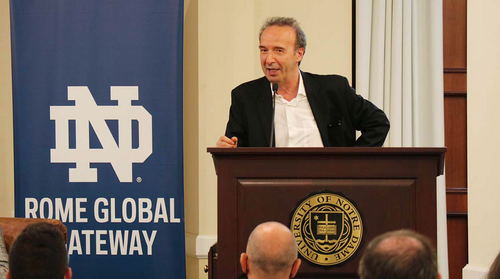
The University of Notre Dame's Rome Global Gateway welcomed the Academy Award- and Golden Lion for Lifetime Achievement-winning Italian actor and director Roberto Benigni on Sept. 18.
Benigni joined a conversation on Dante and Cinema, organized by the Rome Global Gateway in collaboration with the Notre Dame Center for Italian Studies, the G. D’Annunzio University of Chieti and Pescara, and Dante 2021 — the national committee for the commemoration of the seven hundred years since the death of Dante Alighieri. He also took part in the presentation of three volumes commenting on his readings of Dante Alighieri’s "Inferno," edited by Franco Musarra and published by Franco Cesati.
Benigni is one of Italy's most beloved and popular actors, directors and screenwriters. He is known to the public for his film "La vita è bella" ("Life is Beautiful," 1997), which he wrote and directed. The movie received the Grand Prize of the Jury at the Cannes Film Festival and three Academy Awards.
Benigni has also proven to be an extraordinarily talented popularizer of high culture, performing and interpreting "The Divine Comedy" by Dante Alighieri, one of the fathers of the Italian language and the Italian literary tradition.
The panel that opened the event included Vittorio Montemaggi (King's College London), Michelangelo Zaccarello (University of Pisa), Rodney J. Lokaj (Kore University of Enna), Claudio Di Felice (Leiden University), director Marc Wagenaar and Sperello di Serego Alighieri, author of "The Sun and the Other Stars of Dante Alighieri." The discussion was moderated by Ulla Musarra Schroeder and Antonio Sorella from the University of Chieti-Pescara.
Benigni made his appearance during the presentation of the last of the three volumes dedicated to "Il mio Dante" (“His Dante”) on the occasion of the commemoration of the 700th anniversary of the death of the supreme poet. He thanked all the people present, live and virtual, and all the people who dedicated their lives to Dante, reading and loving him. Benigni would have loved to be a Dantist himself, but, he compared himself to the musician sending his music to Rossini who received a letter in response saying “in your music there are both some new and some beautiful things, but the beautiful ones are not new and the new ones are not beautiful.” In this way he humbly thanked all the extraordinary scholars who dedicated their time to him and his readings about Dante.
Benigni then introduced his recital of Inferno 5, one of the most iconic cantos Dante wrote. “The world would be different if Inferno 5 did not exist. It is like the air we breathe, it is part of us” he commented. “Even if it is the loudest of the cantos, everything said is whispered, because of the presence of a gentle soul. Each verse has its own sense, and as Flaubert said, God is everywhere but we can’t see him.”
He then started a brilliant, moving recital of the canto, or as Robert Hollander (University of Princeton) once said: “moving, but not too much.” Benigni provided an exceptional reading with a noticeable suspension between sense and sound of the enjambements and a profound respect for the hendecasyllable verses.
The loud silence in the aula was broken by a thunderous, spontaneous applause at the recital of the last tercet: "Mentre che l'uno spirto questo disse, l'altro piangëa; sì che di pietade io venni men così com'io morisse. E caddi come corpo morto cade." “And all the while one spirit uttered this, the other one did weep so, that, for pity, I swooned away as if I had been dying. And fell, even as a dead body falls” (translation by Henry Wadsworth Longfellow).
Click the video below to watch part of Benigni's presentation.
Originally published by at rome.nd.edu on Sept. 29.